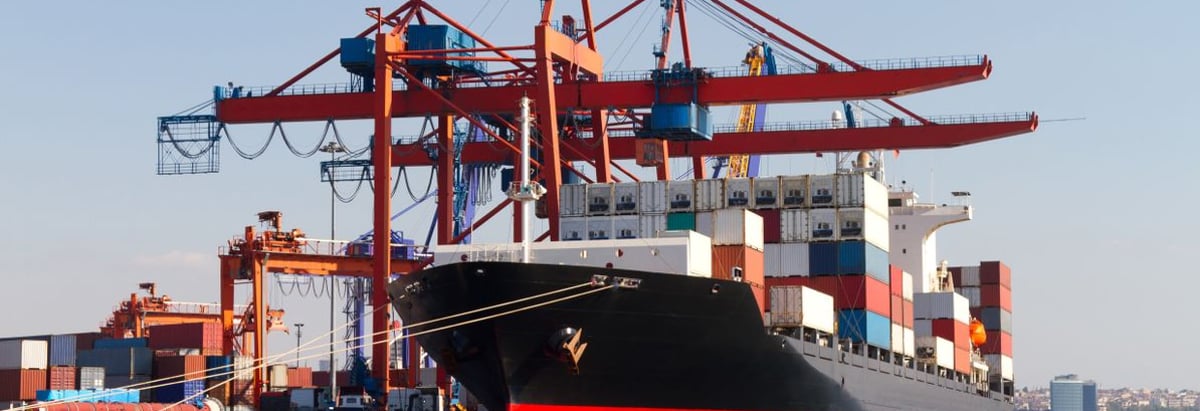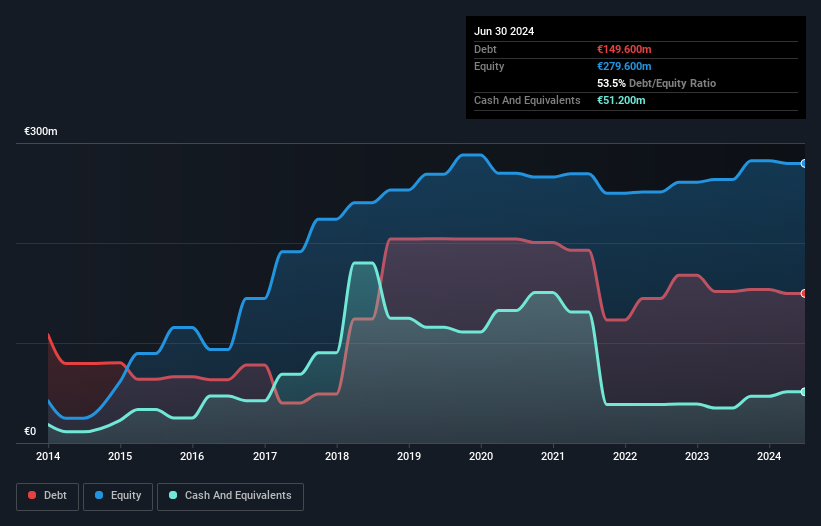- United Kingdom
- /
- Marine and Shipping
- /
- LSE:ICGC
Here's Why Irish Continental Group (LON:ICGC) Can Manage Its Debt Responsibly

Howard Marks put it nicely when he said that, rather than worrying about share price volatility, 'The possibility of permanent loss is the risk I worry about... and every practical investor I know worries about.' When we think about how risky a company is, we always like to look at its use of debt, since debt overload can lead to ruin. We note that Irish Continental Group plc (LON:ICGC) does have debt on its balance sheet. But is this debt a concern to shareholders?
When Is Debt Dangerous?
Debt and other liabilities become risky for a business when it cannot easily fulfill those obligations, either with free cash flow or by raising capital at an attractive price. If things get really bad, the lenders can take control of the business. However, a more common (but still painful) scenario is that it has to raise new equity capital at a low price, thus permanently diluting shareholders. Of course, plenty of companies use debt to fund growth, without any negative consequences. The first step when considering a company's debt levels is to consider its cash and debt together.
View our latest analysis for Irish Continental Group
How Much Debt Does Irish Continental Group Carry?
As you can see below, Irish Continental Group had €149.6m of debt, at June 2024, which is about the same as the year before. You can click the chart for greater detail. On the flip side, it has €51.2m in cash leading to net debt of about €98.4m.

A Look At Irish Continental Group's Liabilities
Zooming in on the latest balance sheet data, we can see that Irish Continental Group had liabilities of €193.4m due within 12 months and liabilities of €206.2m due beyond that. On the other hand, it had cash of €51.2m and €91.1m worth of receivables due within a year. So its liabilities outweigh the sum of its cash and (near-term) receivables by €257.3m.
While this might seem like a lot, it is not so bad since Irish Continental Group has a market capitalization of €911.2m, and so it could probably strengthen its balance sheet by raising capital if it needed to. But it's clear that we should definitely closely examine whether it can manage its debt without dilution.
In order to size up a company's debt relative to its earnings, we calculate its net debt divided by its earnings before interest, tax, depreciation, and amortization (EBITDA) and its earnings before interest and tax (EBIT) divided by its interest expense (its interest cover). The advantage of this approach is that we take into account both the absolute quantum of debt (with net debt to EBITDA) and the actual interest expenses associated with that debt (with its interest cover ratio).
Irish Continental Group has net debt of just 0.84 times EBITDA, indicating that it is certainly not a reckless borrower. And this view is supported by the solid interest coverage, with EBIT coming in at 10.0 times the interest expense over the last year. The good news is that Irish Continental Group has increased its EBIT by 7.1% over twelve months, which should ease any concerns about debt repayment. There's no doubt that we learn most about debt from the balance sheet. But it is future earnings, more than anything, that will determine Irish Continental Group's ability to maintain a healthy balance sheet going forward. So if you want to see what the professionals think, you might find this free report on analyst profit forecasts to be interesting.
Finally, a company can only pay off debt with cold hard cash, not accounting profits. So the logical step is to look at the proportion of that EBIT that is matched by actual free cash flow. Happily for any shareholders, Irish Continental Group actually produced more free cash flow than EBIT over the last three years. That sort of strong cash conversion gets us as excited as the crowd when the beat drops at a Daft Punk concert.
Our View
Happily, Irish Continental Group's impressive conversion of EBIT to free cash flow implies it has the upper hand on its debt. And the good news does not stop there, as its interest cover also supports that impression! When we consider the range of factors above, it looks like Irish Continental Group is pretty sensible with its use of debt. That means they are taking on a bit more risk, in the hope of boosting shareholder returns. The balance sheet is clearly the area to focus on when you are analysing debt. But ultimately, every company can contain risks that exist outside of the balance sheet. These risks can be hard to spot. Every company has them, and we've spotted 1 warning sign for Irish Continental Group you should know about.
If, after all that, you're more interested in a fast growing company with a rock-solid balance sheet, then check out our list of net cash growth stocks without delay.
New: AI Stock Screener & Alerts
Our new AI Stock Screener scans the market every day to uncover opportunities.
• Dividend Powerhouses (3%+ Yield)
• Undervalued Small Caps with Insider Buying
• High growth Tech and AI Companies
Or build your own from over 50 metrics.
Have feedback on this article? Concerned about the content? Get in touch with us directly. Alternatively, email editorial-team (at) simplywallst.com.
This article by Simply Wall St is general in nature. We provide commentary based on historical data and analyst forecasts only using an unbiased methodology and our articles are not intended to be financial advice. It does not constitute a recommendation to buy or sell any stock, and does not take account of your objectives, or your financial situation. We aim to bring you long-term focused analysis driven by fundamental data. Note that our analysis may not factor in the latest price-sensitive company announcements or qualitative material. Simply Wall St has no position in any stocks mentioned.
About LSE:ICGC
Irish Continental Group
Operates as a maritime transport company in Ireland, the United Kingdom, and Continental Europe.
Excellent balance sheet average dividend payer.
Similar Companies
Market Insights
Community Narratives




